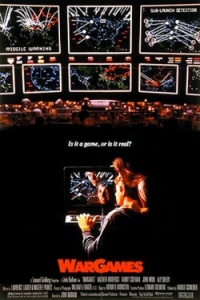Difference between revisions of "Banality of Simulated Evil"
| Line 1: | Line 1: | ||
[[Image:Wargames.jpg|thumb|200px|The problems associated with treating simulated evil like actual evil was demonstrated in the 1983 film [http://en.wikipedia.org/wiki/War_Games_%28film%29 "War Games."]]] | [[Image:Wargames.jpg|thumb|200px|The problems associated with treating simulated evil like actual evil was demonstrated in the 1983 film [http://en.wikipedia.org/wiki/War_Games_%28film%29 "War Games."]]] | ||
| − | '''"The banality of simulated evil: designing ethical gameplay"''' is a scholarly report written by [[Miguel Sicart]]. From the abstract, it "offers an analytical description of the ethics of game design and its influence in the ethical challenges computer games (and [[Virtual Environment|virtual environments]]) present." | + | '''"The banality of simulated evil: designing ethical gameplay"''' is a scholarly report written by [[Miguel Sicart]]. From the abstract, it "offers an analytical description of the ethics of game design and its influence in the ethical challenges computer games (and [[Virtual Environment|virtual environments]]) present." ([[Tops & Categories|Back to index]]) |
==Summary of Article== | ==Summary of Article== | ||
Revision as of 05:50, 25 November 2011

"The banality of simulated evil: designing ethical gameplay" is a scholarly report written by Miguel Sicart. From the abstract, it "offers an analytical description of the ethics of game design and its influence in the ethical challenges computer games (and virtual environments) present." (Back to index)
Contents
Summary of Article
Sicart begins by summarizing a 1963 article in The New Yorker by Hannah Arendt, who documented the trial of Otto Adolf Eichmann, a worker for the German government during the Holocaust in Nazi Germany. Acting as a cog for the bureaucratic machine, Eichmann did not truly see the horrible consequences of his actions as he worked hard to make sure his tasks were complete. It is that separation of act and consequence that defines the banality of evil in Arendt's article. Per Sicart: "the Banality of Evil can be defined as a designed limitation of ethical agency in complex multi-agent, hierarchical systems." Thus Eichmann had no real moral decision to make since anything he did he would never see the final outcome of, being the death of millions of people. So he continued his work as he deemed it necessary, efficiently as well. In comparison, no one drop of water feels it is personally responsible for creating a flood.
This brings Sicart's question: "Are computer games systems of this kind?" The question is focused on popular violent and suggestively themed games such as Defcon. After analyzing or referencing several other games and virtual environments, violent or otherwise, he makes the following conclusions:
- Games limit their players' ethical agency by the isolation of them from judgment on the ethicality of certain actions. Dependence, or in some cases Trust, is placed on a closed system, the game itself, for that judgement.
- Consequentially, players' knowledge of the ethicality of their actions and their future actions are constrained to the limits of the game, which he declares as a type of Infosphere.
- The preconceived positions on moral issues are still in play as players play games.
Sicart goes into heavy detail as to how this works out, making multiple references to aspects of Information Ethics. He then ends his report with the five criteria for ethical gameplay design, which are:
- Creating an ethically relevant game world.
- Have a world that reacts to player actions, and not one that quantifies their being.
- Rigorously test the ethical capability of the player.
- Have players/characters with similar complexity and ability to adapt.
- Challenge players' creativity by introducing new scenarios that open and/or close doors.
Mechanics
Sicart, in the context of Information Ethics, defines a video game to be an Information System and/or Infosphere constrained within design. The player is an agent amongst many within the game. Scripting, if any within the game, manipulates the moral status in the game. Values internal and external do have a critical role, as games typically try to be a simulation (unless it is pure fiction).
He defines two Gradients of Abstraction:
- Constrained to "direct interaction between agents and the state machine by means of game mechanics." (Procedural GoA)
- "The game system as simulation and agents as ethical agents." (Semantic GoA)
Here, #2 is composed from #1, and all Levels of Abstraction can then be viewed through these.
Suggestions for Ethical Game Design
Sicart suggest five principles for designing "morally relevant" games:
- 1. Create an ethically relevant game world.
- 2. Do not quantize your player’s actions: let them live in a world that reacts to their values.
- 3. Exploit the tension of being an ethical player.
- 4. Insert other agents with constructivist capacities and possibilities.
- 5. Challenge the poietic capacities of players, by expanding or constraining them.
Sicart argues that designers should consider using these principles specifically in terms of Levels of Abstraction. This translates to (1) creating a game world where ethics are important; (2) designing a game world to respond to player's moral actions; (3) presenting challenging ethical situations for the player; (4) allowing the player to enact their own ethics; and (5) giving the player more power or less power in making moral choices.